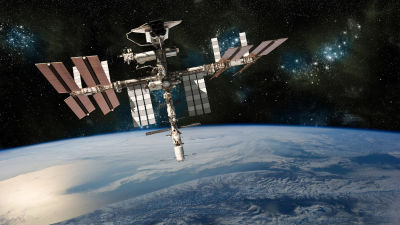Northumbria University leads major study to improve Space Station astronauts' health

Space health experts at Northumbria University are leading research into how astronauts’ bodies decondition while living and working on the International Space Station (ISS).
Orbiting the Earth at an average altitude of 250 miles, astronauts on board the ISS experience significant deconditioning of their bodies due to the reduced gravity environment. Their muscles become smaller and weaker, and their bones lose density.
A team from Northumbria University’s Aerospace Medicine and Rehabilitation Laboratory, working with the University of Southampton and Durham University, has secured funding from the UK Space Agency to explore the decline in size, quality and strength of spinal muscles among astronauts after spending six months living and working on the ISS.
They will also assess changes in astronaut spinal posture, their walking technique, control of movement and pain, immediately following the astronauts’ returning from their mission to see if these changes are related to the changes seen in their spinal muscles and bones. The team will also repeat their measurements 30 days after landing to evaluate the effects of the intense astronaut reconditioning programmes in the first month returning to Earth.
The Northumbria University team will also take its previous artificial gravity ‘bedrest study’ to the next level after being involved in the campaign in 2019.
In the last study, 24 participants spent 60 days in bed at the :envihab facility in Germany, where they continuously laid in a head down tilt position to simulate the long-term effects of exposure to microgravity.
They were also exposed to artificial gravity for 30 minutes each day. A piece of equipment called a human centrifuge would spin the participants so that they were pulled down onto their feet, simulating the gravitational loading normally experienced when standing up against Earth’s gravity. The next bedrest study will take place in Slovenia and will also involve participants performing resistive vibration exercise while they are spun on the centrifuge.
This study can also help with people on Earth suffering with lower back pain and age-related declines in spinal posture. Researchers also expect that there is a growing number of people with spinal deconditioning following the Covid lockdowns because of increased sedentary behaviour.
The latest study at Northumbria is one of five new projects set to receive a share of £440,000 of UK Space Agency funding in its first year. These research projects will support much longer space missions needed to explore the Moon and further afield.
Science Minister George Freeman says, “Our space science is about cutting-edge life science as well as rocketry and satellites: the UK is at the heart of state-of-the-art biomedical monitoring, providing huge potential insights into human health.
“This research could allow astronauts to safely embark on longer and more challenging missions, for the benefit of us all.”
The announcement comes during World Space Week, which runs 4th-10th October. The annual event, led by the United Nations, celebrates the contribution of science and technology to improving lives on Earth. This year’s theme is Women in Space.